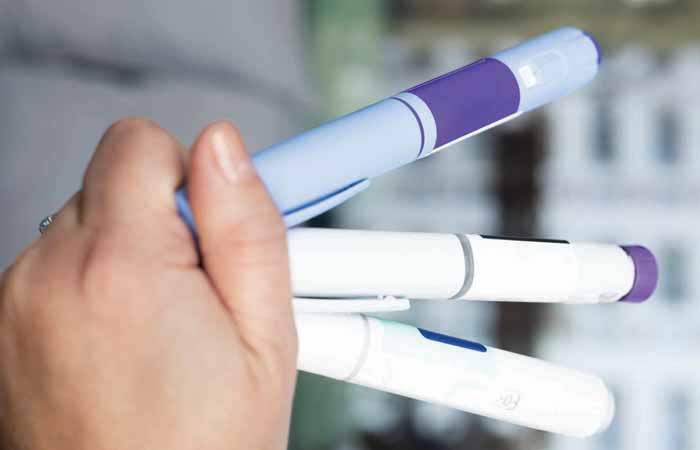In Conditions
Follow this topic
Bookmark
Record learning outcomes
There are many factors that act as predictors for our health. Genetics, environment, socio-economic factors and accessibility can all influence the conditions we are predisposed to or develop. Our weight and nutrition levels are huge indicators of overall health, and while they may be dependent on some of these factors, there is plenty of advice pharmacy teams can share with customers to manage their weight and sustain a good level of nutrition.
What does it mean to be a ‘healthy weight’?
Everybody is different. There is no ‘one size fits all’ when it comes to assessing weight and nutrition. There are, however, general rules of thumb that can be followed. “A healthy weight is generally defined as a weight range that supports good health and reduces the risk of disease,” says Bini Suresh, British Dietetics Association (BDA) spokesperson and lead dietician at Cleveland Clinic London.
“In the UK, we commonly use Body Mass Index (BMI) as a screening tool, with a BMI between 18.5 and 24.9kg/m² typically considered a healthy range for most adults.” For those with an Asian, Chinese, Middle Eastern, Black African or African-Caribbean family background, a lower BMI score is needed to measure overweight and obesity.
A BMI of between 23 and 27.4kg/m² is in the overweight range. 27.5kg/m² or above indicates the obese range.
“However, BMI doesn’t consider muscle mass, bone density or fat distribution, so it’s only one part of the picture,” says Bini. It is a limited measure, in that it measures whether someone is carrying too much weight but does not discern whether this is fat or muscle. So, for example, athletes who are very muscular may show a high BMI despite not having much fat on their bodies.
It is also important to consider a range rather than an exact number when thinking or speaking about a healthy weight, as weight fluctuates throughout one’s life, and sometimes throughout one month for those who menstruate.
“Being within a healthy weight range can support hormonal balance, better energy levels, mobility, and lower the risk of developing long-term conditions such as type 2 diabetes, cardiovascular disease, and certain cancers,” says Bini. Regular exercise and a balanced diet are key to achieving a healthy weight range.
“Maintaining a weight appropriate for your body can have a significant impact on your health”
Getting the balance right
The NHS recommends that adults do some form of physical activity every day, and over a week, should aim to do 150 minutes of moderate intensity or 75 minutes of vigorous intensity activity, including strengthening activities. Long periods of sitting or inactivity should be reduced.
Exercise not only provides an opportunity to manage one’s weight, but it has a positive ripple effect on other aspects of health, decreasing the risk of multiple conditions. “Maintaining a weight appropriate for your body can have a significant impact on your health,” says Bini. “Being underweight may be associated with reduced immune function, nutrient deficiencies, increased risk of fractures due to lower bone density, and reduced muscle mass and strength.”
On the other hand, being overweight can increase the risk of fatty liver disease, joint problems and osteoarthritis, type 2 diabetes, heart disease, certain cancers and high blood pressure.
“That said, it is important to remember that health is not determined by weight alone,” says Bini. “Nutrition quality, physical activity, sleep, mental wellbeing and other health behaviours are just as important and should be considered together.”
Endless possibilities for GLP-1s
Wegovy, Ozempic and Mounjaro have become buzzwords over the last year or so, creating waves for their use as weight loss drugs.
“Medications like Wegovy (semaglutide), Ozempic (lower-dose semaglutide) and Mounjara (tirzepatide) belong to a class of drugs called GLP-1 receptor agonists (and dual GIP/GLP-1 agonists in the case of Mounjaro),” says Bini Suresh, lead dietician at Cleveland Clinic London and British Dietetic Association spokesperson.
“While their primary use is for type 2 diabetes management, they also support appetite regulation, improved satiety and reduced calorie intake, leading to a significant weight loss when paired with lifestyle changes.” Significant weight loss and type 2 diabetes management, however, are not the only impacts of these medicines.
“Additional benefits observed include improved blood glucose control, lowered blood pressure, reduced low-density lipoproteins cholesterol and triglycerides, lowered inflammatory markers and potential cardiovascular benefits – some trials show reduced heart attack and stroke risk in high-risk individuals,” says Bini, which new studies support.
Research presented at the 32nd European Congress on Obesity, which took place in May this year, found that certain weight loss drugs could reduce the risk of 42 conditions including heart attack, early death and stroke within three months of treatment.
It is well-known that obesity is linked to these conditions and more – diabetes, dementia, cancer, sleep apnoea – and is one of the most draining conditions on healthcare systems’ resources. By reducing obesity, these medications are helping people get to a healthy weight, which we know is better for almost every aspect of one’s health.
“A generation ago, effective drugs for obesity would have been a pipe dream. Yet, here we are with the potential to make a massive dent in the number of lives cut too short by cardiovascular disease and other conditions such as dementia and cancer,” says Dr Sonya Babu-Narayan, clinical director at the British Heart Foundation. “There is cause for optimism, as this will help people to live in good health for longer, and [be] able to work for as long as they want to.”
Some things to remember
While this research is exciting, it is important to remind customers embarking on treatment that they should not do so without caution. “These drugs are not without side effects, such as nausea and gastrointestinal upset, and long-term use requires clinical supervision,” says Bini.
“These medications are not a ‘quick-fix’ and should be used alongside dietary changes, physical activity and behaviour support. They are most effective when embedded in a structured, clinically supervised weight management plan.”
If your pharmacy offers a weight-loss service, ensure that you are advertising it in the pharmacy, online or by attaching pamphlets with the accompanying benefits to customers’ prescriptions.
This is a great way to get customers aware of the service without bringing it up in conversation, as it may be a sensitive topic for some customers. If someone does show interest in the service, find a private space to discuss the treatment with them, including all benefits, risks, lifestyle changes required and any costs involved.
Remember, too, that as these drugs are still only licensed for managing type 2 diabetes and as weight-loss aids, only those who qualify will be able to use the service.

GLP-1 agonists (like Ozempic and Wegovy) help lower blood sugar levels and promote weight loss, as they also help to regulate appetite.
“A generation ago, effective drugs for obesity would have been a pipe dream. Yet, here we are”
What to eat
Everything that we eat impacts our nutrition levels and, indeed, our weight. Limiting processed foods, sugars and fatty foods whilst focusing on wholefoods is a good place to start.
Women should aim to consume 2000 kilocalories (kcal) per day (which in the context of food and nutrition is the same as calories), whilst men can aim for 2500 kcal, which accounts for all food and drinks.
One of the cornerstones of a good diet is eating a variety of fruits and vegetables, which are great sources of vitamins and minerals. The NHS recommends eating five portions of fruit and vegetables a day.
“People often struggle with finding practical – and tasty – ways to eat five portions of veg and fruit a day,” says Carrie Ruxton, dietician and spokesperson for The Health and Food Supplements Information Services (HSIS).
Carrie and Dr Nisa Aslam, GP and HSIS spokesperson, have five simple ways for customers to up their micronutrient intakes:
1. Invest in a daily multivitamin and multimineral: While diet should always be the cornerstone, a daily multinutrient supplement is a simple way to ensure you’re getting all the nutrients you need
2. Add flair to your fibre: Those who prefer yoghurt and fibre-rich granola or cereal for breakfast, or maybe even a healthy mid-afternoon snack, can also add some chopped apple or frozen berries to increase its vitamin and mineral profile
3. Enjoy a midday souper boost: When it comes to lunch, vegetable-rich soups and salads are a great go-to for getting a one- or two-portion boost in the middle of the day. Whether you make them at home or buy them from a supermarket, they all count towards your five-a-day
4. Add a nutrient-boosting side: For dinner, home-made stews and curries are great ways to get some more veg into your daily diet. If time doesn’t always allow for cooking, add a side of vegetables or salad to any ready meals. Simply add a squeeze of lemon and a drizzle of olive oil for extra nutritious flavour
5. Have a protein fix: High protein foods – whether red meat, eggs, fish, poultry, nuts, beans or pulses – are rich in minerals and vitamins and help to keep us feeling fuller for longer.”
Customers who exclude food groups from their diet, for example, vegans, vegetarians or those who are lactose-intolerant, should consider taking a supplement if they are worried that they are not getting the nutrients they need from their diet.
It is possible to get all that you need from your diet, but time, money and accessibility may prevent people from achieving this. Speaking to a nutritionist or dietitian, regarding supplementation, is recommended.

Smoothies are a great way to consume multiple fruits and vegetables in one go.
What are free sugars?
Sugar, a type of carbohydrate, can be naturally occurring or synthetic – such as artificial sweeteners. It is widely known that excess sugar consumption is generally not good for your health, and can lead to weight gain, impact energy levels and cause tooth decay.
Sugar does not need to be avoided altogether, in fact, the body needs sugar to run, but customers should know where they are getting their sugar intake from and be careful not to exceed the recommended amount per day.
This can be difficult to discern, as many of the products we buy whether at the supermarket or a restaurant have what are called ‘free sugars’. They can be found in soft drinks, fruit juices, jams, chocolate spreads, biscuits, pastries and cakes.
“Free sugars are sugars added to foods and drinks by manufacturers, cooks, or consumers, as well as sugars naturally present in honey, syrups, fruit juice and fruit juice concentrates,” says Bini Suresh, dietician at Cleveland Clinic London and British Dietetic Association spokesperson. “They do not include sugars found in whole fruits, vegetables or dairy products.”
The sugars in fruit, vegetables and milk do not appear to have negative impacts on our health, and they also come with nutrients like fibre. The sugar in fruit juice and syrups, however, have come out of their cells and have become free sugars, losing their fibre and nutrients in the transformation process.
As whole foods are condensed, we consume more sugar without realising it and hence more calories. A good example is that while you wouldn’t eat four apples in one go, you may drink their juice in one glass of apple juice, without feeling full.
There are several health risks associated with the overconsumption of free sugars, including:
- Weight gain – free sugars “contain high energy density and low satiety,” says Bini
- Increased risk of type 2 diabetes
- Increased risk of cardiovascular disease
- Dental decay
- Blood sugar and insulin spikes “which can promote fat storage,” says Bini.
“NHS and UK dietary guidelines recommend that free sugars should make up no more than five per cent of our total energy intake, roughly 30g per day for adults, and less for children,” says Bini.
“That’s the equivalent of around seven sugar cubes. Reducing intake by limiting sugary drinks, sweet snacks and processed foods is a good first step towards better health.” To put this into perspective, one standard chocolate bar is 25g of free sugar, a 330ml can of cola equals 35g of free sugar, and a 150ml glass of fruit juice equals 12g of free sugar.
Some tips can include encouraging customers to forgo the sugar in their tea and coffee, avoid sugary snacks and eat more whole foods. The more whole foods your customers can incorporate into their diets and limit processed foods, the better.

